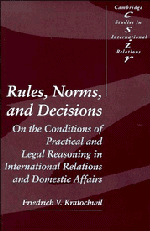 Rules, Norms, and Decisions
Rules, Norms, and Decisions Book contents
- Frontmatter
- Contents
- Acknowledgements
- Introduction: The resort to norms
- 1 Rules, norms, and actions: laying the conceptual foundations
- 2 Anarchy and the state of nature: the issue of regimes in international relations
- 3 The emergence and types of norms
- 4 The force of prescriptions: Hume, Hobbes, Durkheim, and Freud on compliance with norms
- 5 The discourse on grievances: Pufendorf and the “laws of nature” as constitutive principles for the discursive settlement of disputes
- 6 The notion of “right”
- 7 The question of “law”
- 8 The path of legal arguments
- Conclusion: The international legal order, international systems, and the comparative analysis of the practice of states
- Notes
- Index
6 - The notion of “right”
Published online by Cambridge University Press: 01 June 2011
- Frontmatter
- Contents
- Acknowledgements
- Introduction: The resort to norms
- 1 Rules, norms, and actions: laying the conceptual foundations
- 2 Anarchy and the state of nature: the issue of regimes in international relations
- 3 The emergence and types of norms
- 4 The force of prescriptions: Hume, Hobbes, Durkheim, and Freud on compliance with norms
- 5 The discourse on grievances: Pufendorf and the “laws of nature” as constitutive principles for the discursive settlement of disputes
- 6 The notion of “right”
- 7 The question of “law”
- 8 The path of legal arguments
- Conclusion: The international legal order, international systems, and the comparative analysis of the practice of states
- Notes
- Index
Summary
INTRODUCTION
In our examination of different norm-types the notion of right was only cursorily treated as an example of impure norms of coordination. Considering the importance of rights in our normal discourse, such silence appears strange indeed. Furthermore, as the discussion of Kant's rigorism in imposing duties on all of us shows, “rights” are different from duties. They are not simply prescriptions which demand something from us but are special entitlements, which at the same time may limit the range of persons who have a duty towards me as a right-holder. In a way, however, rights also seem to have the opposite function: they are sometimes claimed against “the world,” as the argument for subsistence rights of all people everywhere shows. In addition, right-claims are often advanced on behalf of animals and even inanimate objects of natural beauty or cultural importance. Thus, right-based arguments cover a wide field and put forward a variety of claims that cannot all have the same status for obvious reasons. Claims to subsistence are likely to deserve our attention more than appeals that our “species chauvinism” is misplaced, and that animals should not only be exempted from unnecessary cruelty and maltreatment but should be accorded full protection on the basis of rights.
In spite of all this diversity there is a common denominator. All arguments about rights stake out claims backed by reasons why these demands should be socially protected.
- Type
- Chapter
- Information
- Rules, Norms, and DecisionsOn the Conditions of Practical and Legal Reasoning in International Relations and Domestic Affairs, pp. 155 - 180Publisher: Cambridge University PressPrint publication year: 1989


